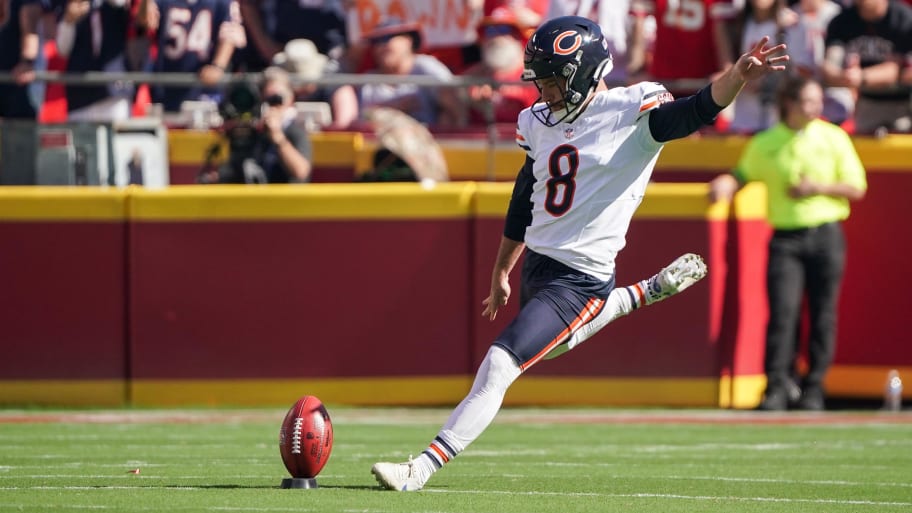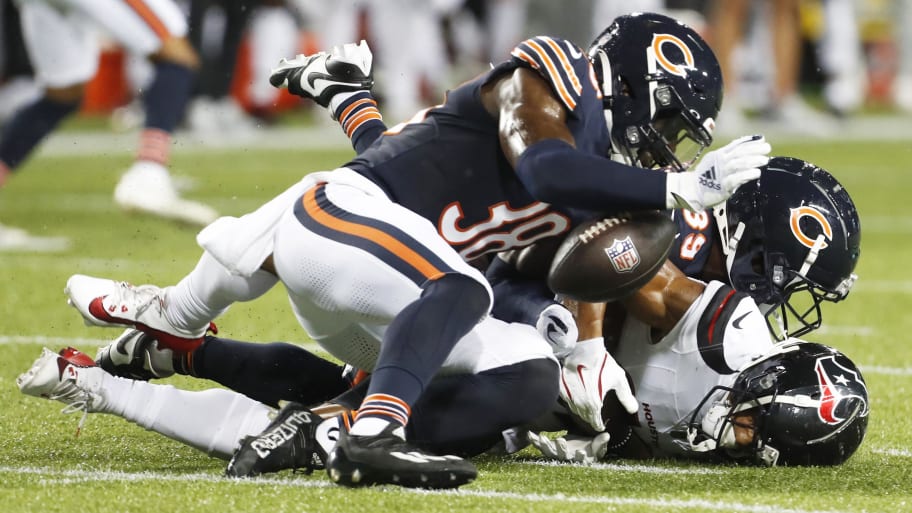
The NFL’s new dynamic kickoff was anything but on Thursday night in a weather-canceled Hall of Fame game opener between the Chicago Bears and the Houston Texans in Canton. I’d imagine some of this was by design, with the game—a glorified joint practice, really—serving more as a forum for coaches to evaluate the spatial blocking skills of their players and for some returners to get reps.
I don’t think the kickoff will look anything like this when the regular season comes, down to the way the receiving team blockers dropped back toward the return man on most of these kicks instead of simply going after their opponents.
But what it lacked in dynamism, it made up for in being stunning when you take a not-so-distant look into the league’s past and consider how (relatively) quickly we arrived at a point of a kickoff adjusted for safety. The NFL accepting the realities of head trauma is a very American story. The game’s signature cacophony of flashbulbs kickoff play wasn’t completely revamped into something a bit more stationary (and as a byproduct, potentially more exciting if it yields more returns, which boosts scoring) out of simple love and tenderness.
The League of Denial era was less than a decade ago. The movie Concussion came out in 2015. Commissioner Roger Goodell was asked at this year’s Super Bowl press conference about the comments he made in ‘12 about a “ground war” against reporting on concussions that, he felt, were not backed up scientifically. He used the word “irresponsible” at the time. At the Super Bowl in Las Vegas this year, he said that “we want them to understand where we are, how we’re making the game safer, the things that we’re doing … Taking techniques out of the game, modifying rules, making sure that we’re adding extra protections in so that we can identify when players are injured. People didn’t think we could change our culture and our players are now raising their hands when they think they have a concussion potentially or when they see somebody else.”
We, societally, are not a proactive lot. This is especially true of our bigger businesses and other entities. Our government routinely passes eleventh-hour legislation to avoid total shutdowns. Like the Once-Ler in The Lorax, until all the Truffula trees are axed and the Swomee-Swans fly away, we aren’t looking around and considering the global implications of our hardheadedness. We do things until they are so deleterious to our health and ourselves that we cannot do them anymore in good conscience.
All of this to say that the NFL seriously altered a game that often serves as a kind of bellwether of our societal ideas on toughness; one that is sacrosanct because of what it represents to some. It’s a big step. Players were allowed to wear Guardian Caps in a game for the first time Thursday, though I did not see anyone actually doing it. While not marketed as an anti-concussion device, the caps do seem to re-route the impact of head-on collisions, which could reduce trauma. One NFL player recently told me of the caps that “my brain is what it is,” which reflects the slow-dying warrior ethos of NFL football, though he now plays in a league where there are avenues toward increasing his protection if he so chooses.

I’m not one to credit billion-dollar enterprises for doing what they should have done a long time ago. The NFL revamping its kickoff is a bit like a fast food chain going overboard in promoting its use of “real” ingredients. It’s great and all, but what took so long? And what the hell was happening before?
Still, it’s worth noting that the acknowledgement of and self-reporting of concussions, while still controversial, is largely normalized. Early retirements are not only accepted but understood. Patrick Willis was part of this year’s Hall of Fame class after playing just eight years, retiring at the age of 30 because of the wear on his body (Willis cited his feet specifically). Outside of the loudest factions on both sides of the argument, one that wants football banished forever and one that believes we should return to the way Bear Bryant water-starved his Junction Boys in the middle of the searing heat, we, a football viewing public, seem to be getting closer to getting it. The NFL, despite its foot dragging, is inching along. There’s a way forward with sensible legislation, monitoring and adjustment. If we could get to this point in roughly a decade, what will the NFL look like 10 years from now?
That may be a lot to place on just one benign play (poor Devin Hester, when asked about it during the rain delay, seemed there’s-no-Santa level disappointed). We will eventually lose its significance in a far more engaging debate about new kickoff game theory. By the time it comes to the iconic Super Bowl kickoff moment, I highly doubt there will be anyone pining for an old-fashioned blast out of the end zone. That said, during that time, there will be a few less people injured. There will be a sample size of us as a general public digesting something markedly different, which sets the stage for more common-sense reform. It’s not dynamic, but it is pragmatic. I’ll take it.
This article was originally published on www.si.com as The NFL’s New Kickoff May Not Be Dynamic, but It’s a Step in the Right Direction.







